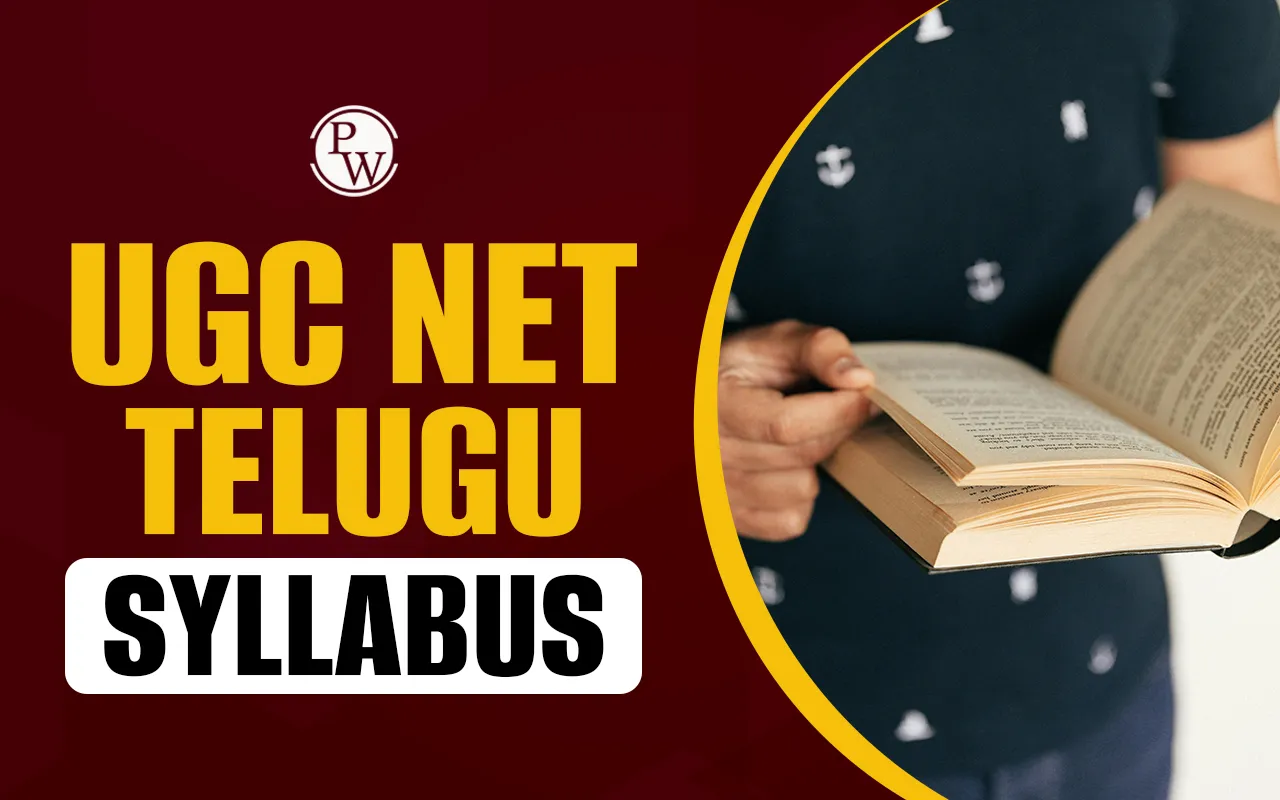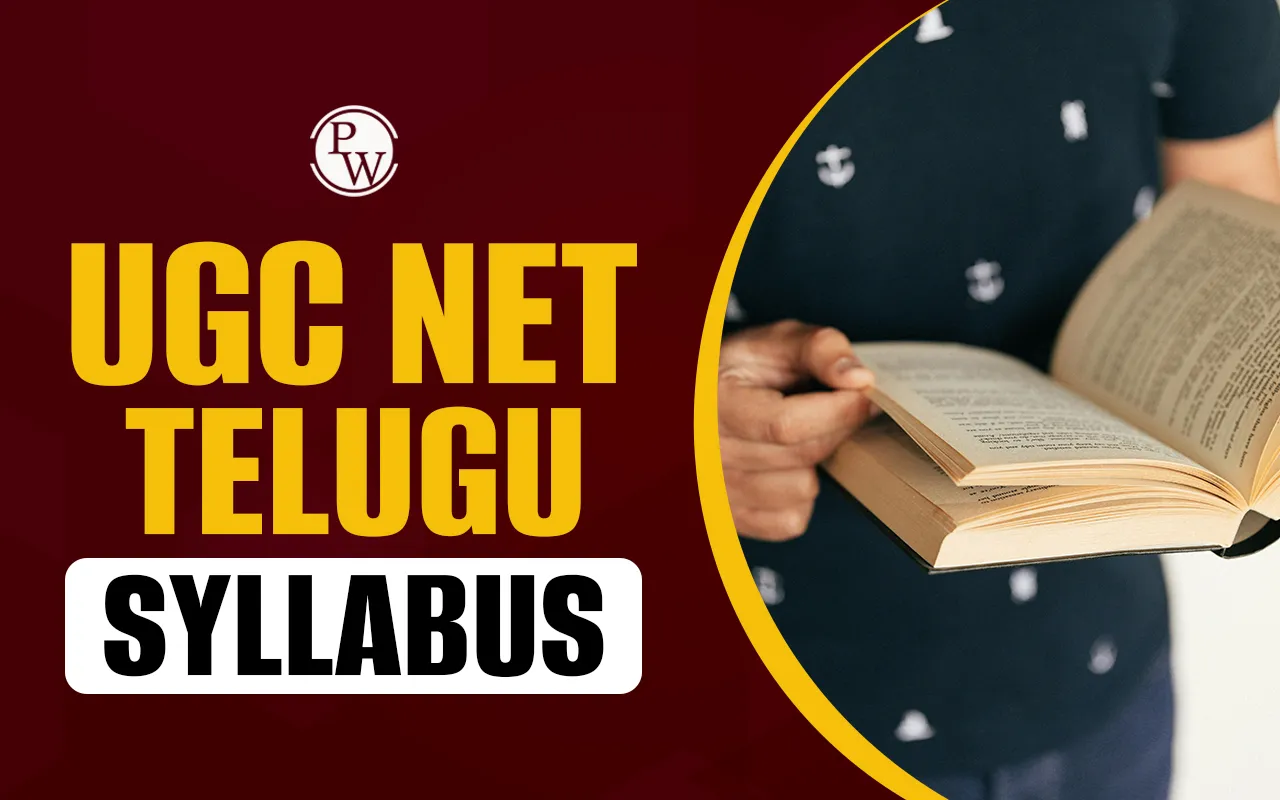

UGC NET Telugu Syllabus should be carefully considered by aspirants preparing for the upcoming exam. A well-planned strategy based on the syllabus helps candidates score high and qualify for the cut-off marks in UGC NET 2025. Those appearing for the UGC NET Telugu exam can find here detailed syllabus insights, exam pattern, marking scheme, and preparation tips.
UGC NET Telugu Syllabus PDF is a crucial resource for exam preparation. It contains important topics from Paper I (common for all subjects) and Paper II (Telugu-specific). Candidates can access the official UGC NET Telugu syllabus on the NTA website to get the most reliable and updated information.
The UGC NET Telugu Exam, conducted by the National Testing Agency (NTA), is meant to determine eligibility for the posts of Assistant Professor and Junior Research Fellowship (JRF) in Indian universities. Candidates will find complete details about the UGC NET Telugu Syllabus, Exam Pattern, and Marking Scheme below..
UGC NET Telugu Syllabus 2025 Overview & Key Highlights
Referring to the UGC NET Telugu Syllabus is highly important for success. Paper I covers common subjects such as reasoning, teaching aptitude, and data interpretation, while Paper II is dedicated to Telugu language and literature topics.
By mastering areas such as classical Telugu poetry, modern literature, grammar, prosody, and literary criticism, candidates can maximize their scores. The official UGC NET Telugu Syllabus PDF offers a unit-wise breakdown of topics that will appear in Paper II. Here’s an overview of the exam structure:
| UGC NET Telugu Syllabus Overview | |
| Particulars | Details |
| Exam Name | UGC NET Exam |
| Conducting Body | National Testing Agency (NTA) |
| Exam Purpose | JRF and Assistant Professor Eligibility |
| Exam Level | National |
| Papers Covered | Paper I (General) and Paper II (Telugu Subject) |
| Mode of Exam | Computer-Based Test (CBT) |
| Duration | 3 Hours (180 minutes) |
| Medium of Paper | Paper I is bilingual (English & Hindi). Paper II for Telugu will be in the Telugu language only. |
| Syllabus Coverage | Paper I – Teaching & Research Aptitude, Reasoning, General Awareness; Paper II – Telugu Language, Literature, Grammar & Criticism |
| Total Units in Paper II | 10 Units – Classical Telugu Poetry, Modern Literature, Drama, Prose, Grammar, Prosody, Literary Criticism, etc. |
| Key Topics | Nannaya, Tikkana, Yerrapragada (Kavitrayam), Modern poets (Sri Sri, Viswanatha Satyanarayana), Telugu drama, essays, grammar & prosody |
| Total Questions | 150 (50 in Paper I and 100 in Paper II) |
| Official Website | @ugcnet.nta.ac.in |
Note: Candidates are advised to check the official website regularly for the latest updates on UGC NET Telugu Syllabus PDF.
UGC NET Telugu Syllabus 2025 PDF Download (Official Link)
Candidates can download the UGC NET Telugu Syllabus PDF directly from the official NTA UGC NET portal. The document provides detailed units and subtopics for Paper II, which are crucial for structured preparation. Here is the direct link to download UGC NET Telugu Syllabus”
UGC NET Telugu Syllabus 2025 – Paper 1 & Paper 2 Details
The UGC NET Telugu Exam consists of two papers. Paper I includes common topics like research aptitude, comprehension, and ICT, while Paper II focuses entirely on Telugu language, grammar, and literature.
UGC NET Telugu Paper I Syllabus (General for All Subjects)
Focuses on teaching and research aptitude, including:
-
Teaching Aptitude
-
Research Aptitude
-
Comprehension
-
Communication
-
Mathematical Reasoning & Aptitude
-
Logical Reasoning
-
Data Interpretation
-
ICT (Information & Communication Technology)
-
People, Development & Environment
-
Higher Education System
UGC NET Telugu Paper II Syllabus – Subject-Specific Topics
The UGC NET Telugu Paper II syllabus is based on asking questions related to subject knowledge. Candidates will find questions related to the Telugu language, classical and modern literature, drama, prose, and literary criticism. It is divided into 10 units that cover the evolution of the Telugu language, major authors, poetic traditions, and critical theories.
| Paper II (Subject-Specific: Telugu) | ||
| Unit No. | Unit Title | Topics Covered |
| Unit 1 | History of Telugu Language | Origin, development, phonology, morphology, semantics, dialects, grammar evolution |
| Unit 2 | Classical Telugu Literature | Nannaya, Tikkana, Errana (Kavitrayam), Srinatha, Pothana, Annamayya, Bhakti poetry traditions |
| Unit 3 | Medieval Telugu Literature | Prabandha literature, Satakas (Vemana, Palkuriki Somanatha), social reformist literature |
| Unit 4 | Modern Telugu Literature | Novels, short stories, essays, dramas from 19th & 20th centuries – Gurajada Apparao, Viswanatha Satyanarayana, Sri Sri, C. Narayana Reddy |
| Unit 5 | Telugu Poetry | Traditional poetry, devotional Bhakti works, and modern poetic movements including progressive, revolutionary, and contemporary styles. |
| Unit 6 | Telugu Drama & Theatre | Gurajada Apparao’s Kanyasulkam, modern Telugu theatre, influence of folk traditions |
| Unit 7 | Telugu Prose | Essays, autobiography, travelogues, literary criticism, journals, periodicals |
| Unit 8 | Telugu Grammar & Prosody | Evolution of Telugu grammar, alankaras, chhandas (prosody), usage of sandhi and samasa |
| Unit 9 | Telugu Literary Criticism | Eastern and Western literary theories, rasa, dhvani, vakrokti, and postmodern trends |
| Unit 10 | Comparative & Translation Studies | Influence of Sanskrit & Prakrit, translation of world literature into Telugu, Telugu literature in English translation |
Note: The official syllabus lists broad units, authors and works mentioned here are derived from standard NET preparation sources and past exam trends.
Important Topics in UGC NET Telugu Syllabus 2025 (Unit-Wise)
To maximize preparation, candidates must prioritize high-weightage and scoring areas from the syllabus. Here are some key topics:
| Important Topics in UGC NET Telugu Syllabus | |
| Category | Important Topics |
| Language | Evolution of the Telugu language, its dialects, phonetics, grammar, poetic metres (Chhandas), and literary figures of speech (Alankaras). |
| Classical Literature | Nannaya, Tikkana, Errana, Pothana, Annamayya |
| Medieval Literature | Satakas (Vemana), Prabandha literature |
| Modern Literature | Gurajada Apparao (Kanyasulkam), Sri Sri, Viswanatha Satyanarayana, C. Narayana Reddy |
| Poetry | Bhakti literature, Modern poetry (progressive & revolutionary) |
| Drama | Telugu theatre, Folk traditions, Gurajada’s plays |
| Criticism | Rasa, Dhvani, Vakrokti, Modern literary theories |
UGC NET Telugu Exam Pattern & Marking Scheme 2025
Candidates must understand the UGC NET Telugu marking scheme and exam pattern to strategize preparation. The exam is held online (CBT mode). Every right response is awarded 2 marks, and no marks are deducted for wrong answers.
| UGC NET Telugu Exam Pattern | ||
| Paper | No. of Questions | Total Marks |
| Paper I | 50 | 100 |
| Paper II | 100 | 200 |
| Total | 150 | 300 |
Note: Paper I is bilingual (English & Hindi). Paper II for Telugu will be in Telugu only.
UGC NET Telugu 2025 – Expert Preparation Tips & Strategy
Here are some effective tips for UGC NET Telugu aspirants:
-
Make sure to download and go through the UGC NET Telugu syllabus PDF thoroughly.
-
Divide the syllabus unit-wise and create a proper study timetable.
-
Refer to standard Telugu literature books, anthologies, and critical essays.
-
Practice with previous years’ UGC NET Telugu papers to strengthen preparation.
-
Attempt mock tests regularly to analyze preparation and improve speed.
-
Maintain a revision notebook for poets, critics, movements, and literary terms.
